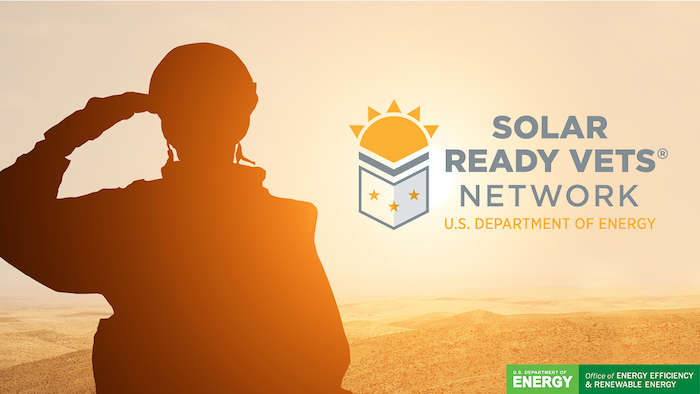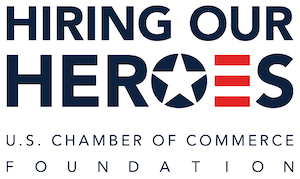Through capacity building initiatives, strategic partnerships, and targeted resources, the Solar Ready Vets Network promotes the representation of military talent across all levels and sectors of the solar workforce.
The program has four key objectives:
- Support solar career navigation and connections for veterans
- Share tools and resources for employers to recruit and retain military talent
- Advance Registered Apprenticeship pathways to solar industry careers
- Expand and promote solar industry SkillBridge opportunities for transitioning service members
Veterans and service members, solar industry employers, veterans career services, and workforce development organizations are invited to join the Solar Ready Vets Network to receive program updates and stay current on opportunities and resources.
Learn more about our key initiatives.
The Solar Ready Vets Network is funded by the U.S. Department of Energy. In 2023, the Interstate Renewable Energy Council (IREC) and partners secured additional funding to build on the accomplishments and milestones reached under two previous iterations of the program. Information on the program history is available here.

Solar Ready Vets Fellowships
The Solar Ready Vets Fellowship connects transitioning service members with on-the-job training in leadership and management roles in the civilian solar workforce.
Offered to employers at no cost, the fellowships are implemented by the Hiring Our Heroes Corporate Fellowship Program with support from IREC and the Solar Energy Industries Association.
How We Work
The Solar Ready Vets Network is funded by the U.S. Department of Energy Solar Energy Technologies Office to strengthen solar career pathways for veterans and support the industry’s efforts to invest in military talent. It is led by IREC in partnership with leading industry, training, and veterans services organizations.
Key initiatives led by the Solar Ready Vets Network include:
Solar Ready Vets Fellowships. We place transitioning service members with solar employers for 12 weeks of on-the-job training in management & professional roles.
Career Navigation. We help military-connected job seekers pursue solar training, professional development, and employment through career navigation resources, mentorship opportunities, and industry connections.
Registered Apprenticeships. We convene industry and training partners to advance registered apprenticeship opportunities through U.S. Department of Labor-approved occupations aligned with solar industry career pathways.
SkillBridge for Solar. We connect employers to construction and electrical SkillBridge programs and launch a new standardized model to train service members for technical and skilled trades roles.
Veterans Pathways to Certification. We promote streamlining requirements for solar certifications based on relevant military experience.
Employer Resources. Engage solar industry employers with resources to attract, hire, develop and retain qualified military talent at all levels of the workforce and amplify successes across the industry.

Partners
IREC is proud to work alongside our partners the Solar Energy Industries Association (SEIA), Hiring our Heroes (HOH), Solar Energy International (SEI), and the Midwest Renewable Energy Association (MREA). The program is funded by the U.S. Department of Energy Solar Energy Technologies Office.
Acknowledgment: This material is based upon work supported by the U.S. Department of Energy’s Office of Energy Efficiency and Renewable Energy (EERE) under Solar Energy Technologies Office (SETO) Agreement Number DE-EE0010493.
Disclaimer: This report was prepared as an account of work sponsored by an agency of the United States Government. Neither the United States Government nor any agency thereof, nor any of their employees, makes any warranty, express or implied, or assumes any legal liability or responsibility for the accuracy, completeness, or usefulness of any information, apparatus, product, or process disclosed, or represents that its use would not infringe privately owned rights. Reference herein to any specific commercial product, process, or service by trade name, trademark, manufacturer, or otherwise does not necessarily constitute or imply its endorsement, recommendation, or favoring by the United States Government or any agency thereof. The views and opinions of authors expressed herein do not necessarily state or reflect those of the United States Government or any agency thereof.



